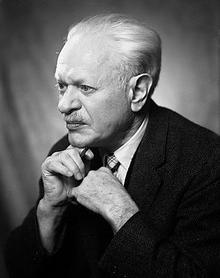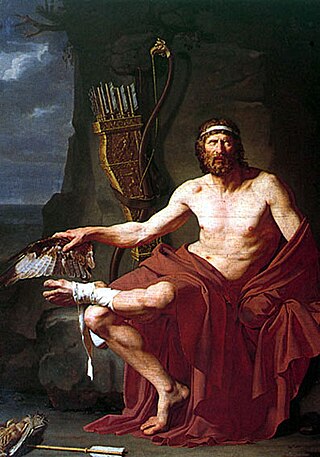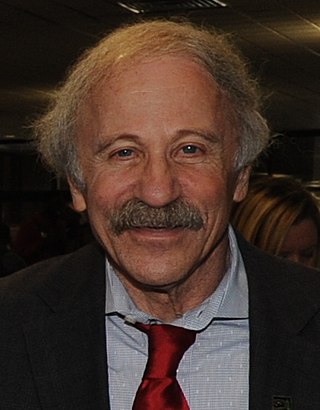
Rhetoric is the art of persuasion. It is one of the three ancient arts of discourse (trivium) along with grammar and logic/dialectic. As an academic discipline within the humanities, rhetoric aims to study the techniques that speakers or writers use to inform, persuade, and motivate their audiences. Rhetoric also provides heuristics for understanding, discovering, and developing arguments for particular situations.
A sophist was a teacher in ancient Greece in the fifth and fourth centuries BCE. Sophists specialized in one or more subject areas, such as philosophy, rhetoric, music, athletics and mathematics. They taught arete, "virtue" or "excellence", predominantly to young statesmen and nobility.
Gorgias was an ancient Greek sophist, pre-Socratic philosopher, and rhetorician who was a native of Leontinoi in Sicily. Several doxographers report that he was a pupil of Empedocles, although he would only have been a few years younger. W. K. C. Guthrie writes that "Like other Sophists, he was an itinerant that practiced in various cities and giving public exhibitions of his skill at the great pan-Hellenic centers of Olympia and Delphi, and charged fees for his instruction and performances. A special feature of his displays was to ask miscellaneous questions from the audience and give impromptu replies." He has been called "Gorgias the Nihilist", although the degree to which this epithet adequately describes his philosophy is controversial.
Critical legal studies (CLS) is a school of critical theory that developed in the United States during the 1970s. CLS adherents claim that laws are devised to maintain the status quo of society and thereby codify its biases against marginalized groups.

Kenneth Duva Burke was an American literary theorist, as well as poet, essayist, and novelist, who wrote on 20th-century philosophy, aesthetics, criticism, and rhetorical theory. As a literary theorist, Burke was best known for his analyses based on the nature of knowledge. Further, he was one of the first individuals to stray from more traditional rhetoric and view literature as "symbolic action."
Pathos appeals to the emotions and ideals of the audience and elicits feelings that already reside in them. Pathos is a term most often used in rhetoric, as well as in literature, film and other narrative art.
Gorgias is a Socratic dialogue written by Plato around 380 BC. The dialogue depicts a conversation between Socrates and a small group at a dinner gathering. Socrates debates with self-proclaimed rhetoricians seeking the true definition of rhetoric, attempting to pinpoint the essence of rhetoric and unveil the flaws of the sophistic oratory popular in Athens at the time. The art of persuasion was widely considered necessary for political and legal advantage in classical Athens, and rhetoricians promoted themselves as teachers of this fundamental skill. Some, like Gorgias, were foreigners attracted to Athens because of its reputation for intellectual and cultural sophistication. Socrates suggests that he (Socrates) is one of the few Athenians to practice true politics (521d).

Inventio, one of the five canons of rhetoric, is the method used for the discovery of arguments in Western rhetoric and comes from the Latin word, meaning "invention" or "discovery". Inventio is the central, indispensable canon of rhetoric, and traditionally means a systematic search for arguments.

Aristotle's Rhetoric is an ancient Greek treatise on the art of persuasion, dating from the 4th century BCE. The English title varies: typically it is Rhetoric, the Art of Rhetoric, On Rhetoric, or a Treatise on Rhetoric.
Critical race theory (CRT) is an academic field focused on the relationships between social conceptions of race and ethnicity, social and political laws, and mass media. CRT also considers racism to be systemic in various laws and rules, not based only on individuals' prejudices. The word critical in the name is an academic reference to critical theory rather than criticizing or blaming individuals.

Philoctetes is a play by Sophocles. The play was written during the Peloponnesian War. It is one of the seven extant tragedies by Sophocles. It was first performed at the City Dionysia in 409 BC, where it won first prize. The story takes place during the Trojan War. It describes the attempt by Neoptolemus and Odysseus to bring the disabled Philoctetes, the master archer, back to Troy from the island of Lemnos.
James Boyd White is an American law professor, literary critic, scholar and philosopher who is generally credited with founding the "law and Literature" movement. He is a proponent of the analysis of constitutive rhetoric in the analysis of legal texts.

Rhetoric of science is a body of scholarly literature exploring the notion that the practice of science is a rhetorical activity. It emerged after a number of similarly oriented topics of research and discussion during the late 20th century, including the sociology of scientific knowledge, history of science, and philosophy of science, but it is practiced most typically by rhetoricians in academic departments of English, speech, and communication.

Cognitive rhetoric refers to an approach to rhetoric, composition, and pedagogy as well as a method for language and literary studies drawing from, or contributing to, cognitive science.
The law and literature movement focuses on connections between law and literature. This field has roots in two developments in the intellectual history of law—first, the growing doubt about whether law in isolation is a source of value and meaning, or whether it must be plugged into a large cultural or philosophical or social-science context to give it value and meaning; and, second, the growing focus on the mutability of meaning in all texts, whether literary or legal. Work in the field comprises two complementary perspectives: Law in literature and law as literature.

Dramatism, a communication studies theory, was developed by Kenneth Burke as a tool for analyzing human relationships through the use of language. Burke viewed dramatism from the lens of logology, which studies how people's ways of speaking shape their attitudes towards the world. According to this theory, the world is a stage where all the people present are actors and their actions parallel a drama. Burke then correlates dramatism with motivation, saying that people are "motivated" to behave in response to certain situations, similar to how actors in a play are motivated to behave or function. Burke discusses two important ideas – that life is drama, and the ultimate motive of rhetoric is the purging of guilt. Burke recognized guilt as the base of human emotions and motivations for action. As cited in "A Note on Burke on "Motive"", the author recognized the importance of "motive" in Burke's work. In "Kenneth Burke's concept of motives in rhetorical theory", the authors mentioned that Burke believes that guilt, "combined with other constructs, describes the totality of the compelling force within an event which explains why the event took place."
Robert I. Weisberg is an American lawyer. He is the Edwin E. Huddleson Jr. Professor of Law at Stanford Law School. Weisberg is an authority on criminal law and criminal procedure, as well as a scholar in the law and literature movement.

Richard Eugene Vatz is an American academic, lecturer and writer who is a professor of Rhetoric and Communication at Towson University.

A rhetorical situation is an event that consists of an issue, an audience, and a set of constraints. A rhetorical situation arises from a given context or exigence. An article by Lloyd Bitzer introduced the model of the rhetorical situation in 1968, which was later challenged and modified by Richard E. Vatz (1973) and Scott Consigny (1974). More recent scholarship has further redefined the model to include more expansive views of rhetorical operations and ecologies.

Constitutive rhetoric is a theory of discourse devised by James Boyd White about the capacity of language or symbols to create a collective identity for an audience, especially by means of condensation symbols, literature, and narratives. Such discourse often demands that action be taken to reinforce the identity and the beliefs of that identity. White explains that it denotes "the art of constituting character, community and culture in language."



